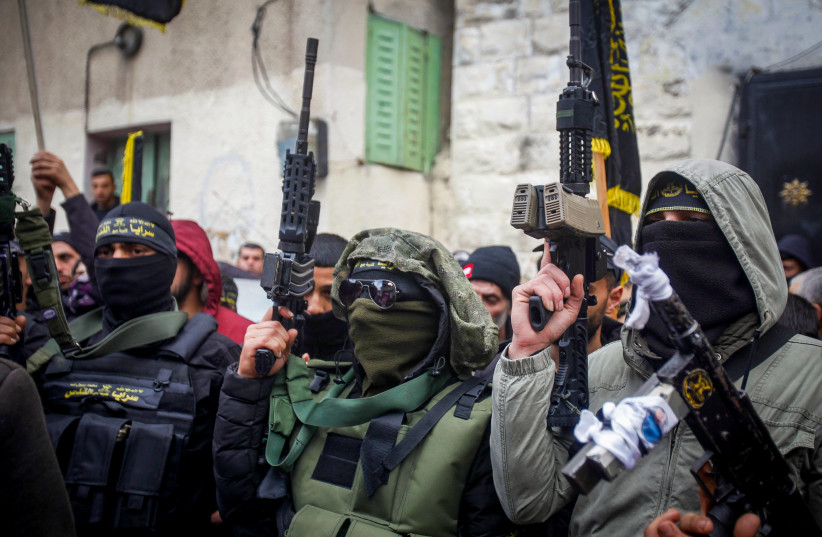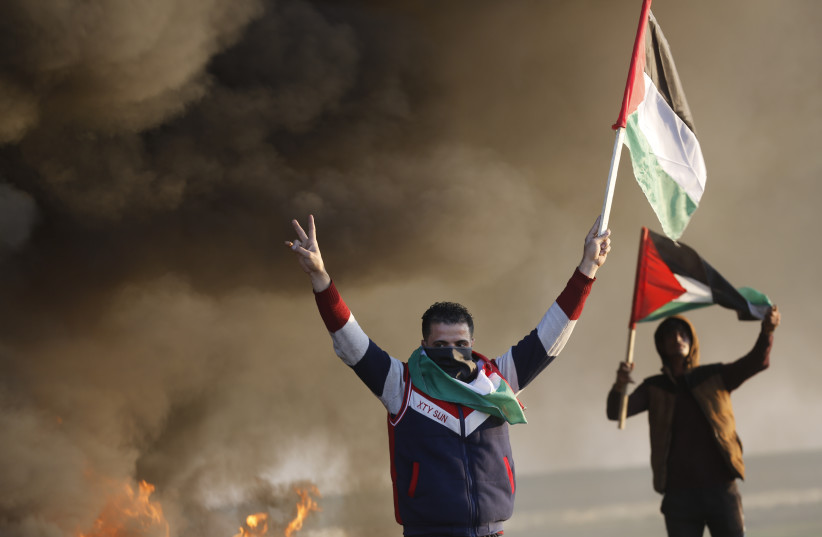Look at Jenin for a preview of what awaits the day after Abbas – analysis
Day after day, night after night, IDF soldiers enter Palestinian cities, villages, and refugee camps looking for terror suspects and making arrests.
The troops almost always encounter some resistance: gunfire, petrol bombs, heavy objects dropped from rooftops, a barrage of rocks. Increasingly, the terrorists detonate roadside bombs.
The raids are usually successful: The suspects are apprehended, and the IDF troops leave mostly unharmed. But in some cases – like on Monday – there are casualties: five border policemen and two IDF soldiers were wounded when a powerful roadside bomb was detonated alongside their armored vehicles in Jenin.
These raids are a critical component of Israel’s security.
IDF operations are to prevent terror attacks
They were vital during the Second Intifada in bringing down the level of terrorism once the decision was made in 2002 for the IDF to re-enter the Palestinian towns, and they have been key over the last year and a half in keeping a mini-wave of terror from turning into a tidal wave washing over the country.
 Palestinian gunmen and mourners attend the funeral of one of the two Palestinians who were killed by Israeli security forces after they opened fire on military post, in Jaba, near Jenin, in the West Bank, January 14, 2023 (credit: NASSER ISHTAYEH/FLASH90)
Palestinian gunmen and mourners attend the funeral of one of the two Palestinians who were killed by Israeli security forces after they opened fire on military post, in Jaba, near Jenin, in the West Bank, January 14, 2023 (credit: NASSER ISHTAYEH/FLASH90)As National Security Adviser Tzachi Hanegbi said in a KAN Bet interview on Monday, soldiers operate in the extremely hostile environment of Jenin to prevent terror attacks in the heart of Israeli cities.
“If we don’t meet those roadside bombs in Jenin, we will meet them on buses in Jerusalem or as car bombs in Tel Aviv. We have to bring the battle to the enemy,” he said. “That is what the IDF has done for months, with amazing results. But it is not an easy battle.”
Monday’s battle was especially difficult and necessitated using an Apache attack helicopter to help extricate the wounded – the first time air power was used during an operation in Judea and Samaria in some 20 years since the Second Intifada.
Former OC Central Command Maj.-Gen. (ret.) Gadi Shamni said that there is a saying in the IDF that in dealing with West Bank terror, it is preferable to use an M-16 rather than an F-16, meaning ground forces rather than air power.
The reason for this is not solely because air power is so much more destructive but also because using air power against West Bank cities only builds up the Palestinian ethos. “If you use these tools, they say, ‘Look how serious [a threat] we are,’” Shamni said.
Not wanting to feed the Palestinian ethos or give the terrorists any “victory picture,” the IDF spent hours under heavy gunfire on Monday extracting the crippled vehicles from Jenin once the wounded soldiers had been successfully evacuated.
Using the helicopter gunship to ensure the evacuation of the IDF soldiers was a reminder to the terrorist organizations of the military’s capabilities. But the fact that the IDF even needed to deploy the helicopter – and, in addition to firing a missile at the gunmen making the evacuation of the wounded difficult, also fired off flares as decoys against shoulder-launched anti-aircraft missiles – revealed the terrorist capabilities as well.
The type of roadside bomb used against the armored IDF vehicles in Jenin on Monday unveiled disturbing military capabilities. This was not “only” a lone-wolf terrorist shooting at IDF soldiers or passing civilian Israeli motorists. Rather, the building and detonation of this type of bomb indicate a terrorist infrastructure in Jenin of a different league.
Israel has been aware of these capabilities for a while
And that caliber of terror, that league of terror, will necessitate a recalibration of Israeli tactics.
The Israeli security establishment has long been aware of these capabilities. It has long been aware of Hezbollah, Hamas and Islamic Jihad’s investments in building up the terrorist infrastructure in this West Bank hotbed.
Last month, Shin Bet (Israel Security Agency) head Ronen Bar publicly stated that Israel had thwarted an Islamic Jihad attempt to produce rockets and a rocket launcher in the Jenin refugee camp to be fired at Israel, much like rockets are fired into the Jewish state from Gaza.
The terrorist capabilities in the northern West Bank are not new to the security establishment, but on Monday, the pictures of the roadside bomb detonated against the IDF vehicles drove these capabilities home to the public. It’s one thing to hear security officials and experts talk about these capabilities; it’s another to wake up and see pictures of a roadside bomb that brings back memories of Lebanon.
 Palestinians burn tires and hurl stones at Israeli forces during a protest on the border with Israel, east of Gaza City, January 26, 2022. (credit: ATTIA MUHAMMED/FLASH90)
Palestinians burn tires and hurl stones at Israeli forces during a protest on the border with Israel, east of Gaza City, January 26, 2022. (credit: ATTIA MUHAMMED/FLASH90)Some Palestinians were celebrating a “victory” on Monday as clips of the bomb detonated alongside the IDF vehicles went viral. But it will likely be a hollow victory. The military is adept at learning lessons and will undoubtedly study what happened on Monday and adjust its tactics accordingly.
One thing the events on Monday will not do is deter the IDF from nightly raids to arrest terror suspects, since that has become a central component in keeping the terror at a relatively low level.
Beyond an enhanced military capability, Monday’s roadside bombing revealed something else everyone knows at a theoretical level but only truly appreciates when it becomes manifest: the Palestinian Authority asserts no control in Jenin nor in the northern West Bank.
That the terror organizations can build and detonate these types of sophisticated roadside bombs shows that a substantial terrorist infrastructure has arisen unimpeded by the PA. Jenin and the northern West Bank have been the focal point of terror against Israel over the last several months because there is no Palestinian governance or monopoly over the use of force there. A vacuum has been created, and in that vacuum, Hamas, Islamic Jihad and other terrorist organizations simply thrive.
Jenin today, where the PA has lost its grip, is a chilling preview of what is likely to emerge throughout the West Bank the day after Palestinian Authority President Mahmoud Abbas dies or can no longer continue in his current role.
If PA impotence is now centered in Jenin and the northern West Bank, this impotence will spread through the territories when Abbas leaves the scene. Currently, the IDF is struggling to figure out how to deal with the vacuum left by the PA in Jenin. Lessons learned there will likely be used elsewhere once Abbas departs and the PA vacuum inevitably spreads.





Comments are closed.